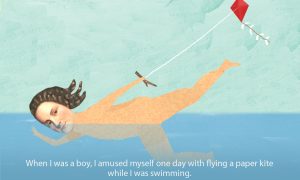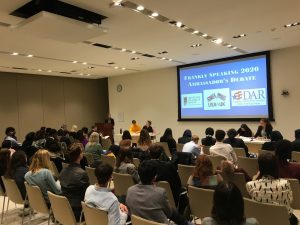The Lady Joan Reid Children’s Author in Residence, Professor Sarah B. Pomeroy recently sat down with our Founding Director, Márcia Balisciano, via the internet, to discuss her upcoming book Benjamin Franklin, Swimmer.
Professor Pomeroy, a distinguished Professor emeritus of Classics and History at the City University of New York, is an accomplished author of numerous books, articles, and reviews on the topic of Women in Antiquity, including the classic Goddesses, Whores, Wives, and Slaves: Women in Classical Antiquity. She has won many awards, including the Ford Foundation Fellowship, Guggenheim Fellowship, the National Endowment for the Humanities Fellowship, and a Mellon Foundation Fellowship. Her pioneering work has been instrumental in our understanding of women in history.
In this short conversation, Professor Pomeroy spoke extensively about her research into Benjamin Franklin’s love of swimming and how he swam extensively in the Thames and the Seine during his time in London and Paris respectively. Professor Pomeroy also spoke on some of the challenges she faced as a woman early in her career and how she was able to overcome these hurdles and later publishing her thought-provoking and pioneering work on the leading role women played in the ancient world.
Transcript below:
MB: It is my pleasure to welcome Sarah Pomeroy, the Lady Joan Reid Children’s Author in residence to speak with us today. Sarah is also the distinguished Professor emeritus of Classics and History at the City University of New York. Welcome Sarah.
SP: Thank you Marcia, nice to be with you.
MB: Well I wanted to start by asking you what drew you to a career as a historian.
SP: The Greek Herodotus, father of history, called his work historia, which means research. I’ve always been interested in doing research and finding out what was not known before and discovering the relationships between facts that are known. For example, I deduced that on his second visit to London, Benjamin Franklin probably chose to live in, what is now known as Franklin House, because it is a short walk to the Thames where he liked to swim. I have a lot to tell you about that. During his first visit to London, Franklin also swam in the Thames. The river was cleaner in the 18th Century, than it was later, but it was wider and shallower, before the embankments were built. The Thames are tidal, and currents could be treacherous, all kinds of ships plied the waters. Their captains would not have thought that they needed to be on the lookout for swimmers. Franklin was a powerful swimmer, doubtless he studied the river, and chose auspicious conditions for his recreational swims and aquatic performances. He writes about one swimming adventure that occurred at a critical point in his life. Emphasising his own bravery and bravado, he glosses over the fact that friends came along and shielded him from the potential danger posed by passing ships. In London, Franklin was not only a long distance and exhibition swimmer, but he also became a successful swimming instructor. In May or June 1726, he easily taught John Wyget a friend who worked with him as a printer and Wyget’s friend how to swim in only two lessons. The swimmers attracted an audience. Franklin responded to their interest by preforming feats of swimming requiring strength, endurance, and grace. As usual he showed off, he even invented some new ways of preforming in the water. He wrote in his autobiography that on this excursion, “I stripped and leapt into the river and swam from near Chelsea to near Blackfriars preforming on the way, many feats of activity, both upon and under water, that surprised and please those to whom they were novelties. I had from a child, ever delighted with this exercise, aiming at the graceful and easy, as well as the useful. All these, I took as occasion of exhibiting to the company and was much flattered by their admiration.” In 1724, Franklin turned down a tempting offer by Sir William Wyndham to open the first American swim school in England. Franklin’s enthusiasm for swimming was doubtless an important part of his success in teaching the sport. He realized he could make a good deal of money by teaching swimming to British aristocrats, but he missed his home and family. Use of Franklin’s skill and success in teaching swimming had spread. Swimming thus became the means by which he effortlessly came in contact with the upper echelons of London society at an early age.
MB: I’m interested to know as a pioneer in the field of Greek and Roman women’s history. How did you begin to be interested in Benjamin Franklin?
SP: I became a member of the American Philosophical Society in 2014. I was elected because of my paradigm changing scholarly work in ancient history. The American Philosophical Society is the oldest learned society in the United States. It was created by Benjamin Franklin in 1743. In order to promote, in Franklin’s words – useful knowledge. We meet twice a year in Franklin’s corner of Philadelphia. At our meetings, we always see his benevolent portrait behind the speakers. I learned that Franklin love to swim. I am a swimmer too. I live in Sag Harbour on Long Island, close to ocean and bay beaches, and I have a heated pool. I swim outdoors every day from April through November. I also like to read about swimming, and I thought it would be fun to find out more about Franklin’s swimming.
MB: Well, I know that your book is about to be published by the American Philosophical Society – Benjamin Franklin, Swimmer. It definitely seems like a unique topic. But tell us more about why this subject and how you chose such a unique view of Franklin to highlight.
SP: Benjamin Franklin’s earliest memories, and first inventions are connected to swimming. In his autobiography, after a traditional opening, reviewing his family’s history, his formal education, and his brief apprenticeship as a candle maker, he wrote a long paragraph about his interest in the sea, in boats, and in swimming. Franklin’s useful inventions were swimming paddles, and a method of kite surfing. He boasted of them later in life. Yet this aspect of Franklin’s biography has never been studied. I’d like to read to you what Franklin wrote in his autobiography about his early experiments in the water when he was growing up in Boston. Many years after the fact, Franklin proudly recalled, “when I was a boy, I made two oval pallets each about 10 inches long and six inches broad, with a hole for the thumb. In order to retain it fast in the palm of my hand. They much resembled a painter’s palette, in swimming, I push the edges of these forward and I struck the water with their flat surfaces as I drew them back, I remember I swam faster by means of these palettes, but they fatigue my wrists. I also fitted to the soles of my feet, a kind of sandals, but I was not satisfied with them. Because I observed that the stroke is partly given by the inside of the feet and the ankles, and not entirely with the soles of the feet.” Franklin’s problem with his swim fins was due to the fact that he swam doing the frog kick. Nowadays we were swim fins doing the flutter kick, and they work very well. Franklin also recalled, “when I was a boy, I amused myself one day with flying the paper kite and approaching the bank of upon which was near a mile broad. I tied the string to a stake and the kite ascended to a very considerable height above the pond while I was swimming in a little time, being desirous of amusing myself with my kite, and enjoying at the same time, the pleasure of swimming, I returned, and loosing from the stake, the strain but the little stick which was fast into it, went again into the water, where I found that, lying on my back, and holding the stick in my hands, I was drawn along the surface of the water in a very agreeable manner. Having then engaged another boy, to carry my clothes around the pond, to a place which I pointed out to him on the other side, I began to cross the pond with my kite, which carried me quite over, without the least fatigue, and with the greatest pleasure imaginable. I was only obliged occasionally to halt a little in my course, and resist its progress, when it appeared that by following too quick, I lower the kite too much, by doing which I occasionally made it rise again.”
MB: Those are amazing quotes. Where did you find all this great information about Franklin and swimming?
SP: Franklin discusses swimming and his letters and, in his autobiography, friends and family also comment on his swimming. Though the evidence is sparse, varied references to swimming occur throughout Franklin’s lifetime and in many contexts. He praises swimming, because it promotes health, hygiene, and safety, especially when people find themselves suddenly in the water. Therefore, knowing how to swim was essential, not only for a professional sailor, but also for anyone who travelled by boat. In those days travelled by boat was common. In his autobiography, Franklin mentions taking boats and ferries in his journeys. He records the perils and pleasures of these voyages in detail. Drownings were such a common occurrence that only multiple disasters, destroying entire families or boatloads, attracted much attention. The water played a decisive role in Franklin’s life. Fearing ocean travel, Franklin’s wife Deborah refused to join him in Europe, and they spent most of their married life apart.
MB: I know that in your new book, you’re going to be highlighting some excerpts about swimming from the Journal of Franklin’s teenage grandson, Benny. Can you tell us a little bit more about him?
SP: Oh, yes. When Franklin’s grandson Benjamin Franklin Bache was in his care in France, he allowed him to swim across the Seine, an activity that was fraught with danger from strong winds and passing ships. Benny’s journal constitutes another important primary source for my book. The escapades of this engaging literate teenager, in France with a benevolent indulgence chaperone have never before been published. Benny was educated in Geneva and wrote his journal in French. In the 20th century, one of his descendants translated the journal into English. There is no doubt that the Journal of Ben Franklin’s grandson will be of great interest both to sophisticated younger readers and to scholars and admirers of Ben Franklin. Like his grandfather, Benny built kites. I want to read a particularly lively excerpt to you about the adventures of Benny and his friend Alexander, as it appears in my forthcoming book, “with Alexander, I have constructed a kite five feet in height. We tried to fly it, but the wind was too strong for the string and it broke, as it was upon the riverbank, and it fell upon the other side. I undressed in haste and swam across the river. But when I reached the other side, I saw some strangers who had seized it, and had already carried it very far. For they were near the village of Boucharate some distance away. They had not had the sense to take the string out of the water, so that I took it and swam with it to the other side. The misfortune made us sad, but it did not destroy all our courage. So we decided to buy another string and make a kite of seven feet.”
MB: I wanted to ask you how you think history is best communicated?
SP: In plain English, so not only scholars, like all intelligent readers can understand it. In writing a book about Benjamin Franklin, I felt it appropriate to adhere to the advice he gives in his treatise on literary style. “I have thought in general, that whoever would write so as not to displease good judges should have particular regard to these three things. That his performance be smooth, clear and short.” Visual evidence is also very important. I include in my book, paintings and photos of places where Franklin swam, places that no longer look as they did in the 18th century. For example, the marshes in Boston, where Franklin and his friend swam as boys have been drained. They now constitute Fenway Park, a name that recalls their original state. In my book I also show artistic diagrams that were drawn in early manuals to illustrate various positions a swimmer could use. Including how to swim if an enemy had tied up your arms and legs and tossed you into the water. I’m happy to acknowledge the enthusiastic help I received from librarians in many libraries, including those founded by Franklin, at the library company in the Philadelphia, and at the American Philosophical Society.
MB: What’s your purpose in writing about history and you’ve dedicated your career to this important area of knowledge. But why history?
SP: In the case of my forthcoming book, it is to try to trace the evolution and importance of swimming, both in the Western world and in Franklin’s life in particular, I will briefly review some of the ways in which both histories intersect. Franklin was in good health due to exercise and was proud of his physique which can be attributed in part to swimming. Being new did not embarrass him at all. And he continued to swim even when he was 80 years old. Swimming in cold water was fashionable in the 17th and 18th centuries. But as usual, Franklin was an independent thinker. In his 50s, he preferred to take air baths as he calls them, naked in front of the window at his lodge on Craven street in London. Incidentally, the fact that swimming is best done in the nude, discourage women from learning how to swim. Latex had not been invented. The bathing attire of early modern women in the western world consisted of a heavy woollen dress and woollen stockings. When waterlogged, this costume would have dragged a woman down. Although Franklin had rejected the idea of starting a swimming school in England when he returned to North America, he became a valuable evangelist for swimming instruction. This time, he did not consider his financial advantages, but rather the public good. He advised parents to teach their children how to swim so that they would be safe and not afraid of the water. When he became an influential figure in Philadelphia, he advocated including swimming in the basic educational curriculum. In 1968, the International swimming Hall of Fame honoured Franklin with membership. The citation mentioned his various inventions, which made swimming more efficient, and his own feats as a swimmer. But most of all his success in promoting swimming as an essential part of education. Benjamin Franklin’s advice about water safety, lifeboat rescue, sea anchors, escaped from shipwrecks, and on the advisability of teaching people to swim for the sake of safety, and avoiding fear of the water is still relevant. To sum up, swimming has always been in Franklin’s words, useful knowledge.
MB: Indeed, well, the audience for this book is young adults, but you’re used to writing for a very sophisticated audience in higher education. So how did you get interested in writing for young people?
SP: All my scholarly books when I was writing about ancient history, they were all of course for adults. Then, I became interested in Maria Sibylla Merian, who was a scientist and artist who went to Suriname in the 18th century and painted watercolours of the animal life, especially insects that she found there, and her paintings became scientific documents. Linnaeus used them as specimens. Linnaeus who never went to the new world. So, he used the Merian’s paintings of insects as actual specimens for his taxonomy. Well, I was writing that book for my grandchildren. I have seven grandchildren. And my daughter was a curator at the National Museum for Women in the Arts. And her colleague, Elizabeth Nicholson, who moved to the Getty became interested in asked me if I would write one of the two books that for children that the Getty publishes each year. And so that became my first book for the younger readers. And it turned out that when I had distributed this book to friends for their grandchildren, some of them kept the book. They like the book for themselves. There’s a very fine line between young adults and adults. I find my grandchildren. My youngest one is 13 is reading the Chernow book on Hamilton at 700 pages. So, inspect some and sometimes you read Philip Putnam. A sophisticated younger reader can certainly read the same kind of book as, as an adult, I find. You know what, Márcia, I wanted to ask you have a question. I was thinking about a Franklin, sitting in front of the parlour windows at Franklin house naked and taking those air baths. The windows that you have now the same windows as you, as must have been the ones that Franklin sat behind or they have they’ve been replaced?
MB: We’re not really quite sure, but they would have been a sash type window. And the glass that we have is old, but we don’t know that it goes back all the way to the 18th century. But regardless, the window height has not been changed. So it would have been quite a sight if you were across narrow Craven Street, having your breakfast and happening to look out of your window and seeing you know, as though a person who liked exercise somewhat portly, if the portraits are to be believed, sitting there without his clothes on taking his air bath because as you pointed out, he thought that was quite helpful to open up the window and let that air in. And actually, in the time in which we’re living through right now with the coronavirus, you can see correlation, in terms of the need for fresh air and the instances of disease dissipates when there is a fresh air source. And in fact, Franklin we think had very prescient ideas about the common cold because he was writing about, if you go into a closed carriage for a drive on a weekend, you might end up catching ill so he had some very progressive ideas, but it might have been a little bit too progressive for the neighbours.
SP: Remember when he had to share a bed with John Adams and in Paris and Adams wanted the window shut and Franklin wanted the windows open and he talked John Adams to sleep with his theories about opening the windows. Also, Franklin had skin diseases and that certainly is a good idea to take your clothes off and feel better if you have skin problems, without any clothes, rubbing your skin. So, he took care of that too, by sitting naked in front of the window.
MB: I love that story about John Adams, you could just see how that played out. And I’m mindful also that John Adams was very critical of Benjamin Franklin for sleeping in when he was the first representative of the fledgling American government trying to convince the French to support the cause of revolution because maybe at his heart, John Adams was in Massachusetts Puritan who had a strong Protestant work ethic and didn’t quite take to Franklin rising late. But on the other side, I think Adams didn’t realize how important Franklin’s approach to diplomacy was in terms of cultivating the relationships with the French court which ultimately led to the contributions from the French that supported the cause of revolution.
SP: I think the French must have gotten up even later than Franklin because Franklin used to swim in the Seine. And with his nude swimming, I think he probably got up before there was a crowd about. Considering how old he was. Though he was never ashamed of his body. So, he swam in the Seine and then he let his grandson swim in the Seine. I don’t know if you’d let your son swim across the Seine.
MB: No, haha, I wouldn’t. But you’ll be pleased to know I am giving them swimming lessons. I hope they turn out to be good and strong swimmers. So, I wanted to ask you what draw you to history personally as a young person because you went on to have such a distinguished career as a historian? Why that subject and not something else?
SP: Some of it was not planned. When I was in college and graduate school, I studied Greek and Latin. But I did my dissertation in papyrology. That is, I read ancient documents that were written in Egypt at the time of Roman domination and piecing them together. First there was philology, that is love of words, because I found three new words that had never been seen before in a Greek document. And they went into this huge Greek dictionary that everybody uses, but it was also a question of history. What was this document about it was a microcosm It was a lease of an olive grove and interestingly enough, the person who, the lessor was a woman, and I never knew that women could sign legal documents in the Roman period in Egypt, 2000 years ago. But when I started out, I wasn’t even interested in the fact that this was a woman I became interested in specifically in women’s history a little bit later, when I actually was a victim of laws at the City University of New York, which made it very difficult for me to advance in my career. They actually had a law saying that if you were that if the woman or if a student or a faculty member was pregnant, she had to not not teach or not be a student the following semester, you couldn’t you couldn’t be pregnant, visibly pregnant and be teaching. Well they’ve done away with these laws, but I had three children. Imagine that this the stop and go wasn’t anything I wanted but that was the law.
MB: Your book that your first book that you published in 1975, Goddesses, Whores, Wives, and Slaves: Women in Classical Antiquity. How was that received? You were so brave and publishing a book with that title and revealing this, hitherto unknown history of women at that period?
SP: All my books are still in print and, and Goddesses, Whores, Wives, and Slaves: Women in Classical Antiquity. is still used as a textbook and people read it for as a trade book. So, I’m very proud of that. As soon as it was published. It was reviewed in all the major publications like TLS, and the New York Times and The New York Review of Books, and it got astoundingly wonderful reviews. And it started a whole new field of study, more people became interested in the history of ancient women. I mean, how many subjects in the ancient world have not been worked over by many people many times? How many times can you read another book about Plato’s Republic or Homer’s Odyssey. But here’s women’s history in 1975. Nobody had ever looked at it.
MB: Especially for women and women’s scholars, it’s important to have mentors. I mean, you certainly have been a role model for the women scholars who have come after you, not only in your field but more generally. But I wondered, did you have a mentor in your career?
SP: No, I didn’t. when I was at Columbia University, they didn’t even have a woman on the faculty in classics. Oh, yes. There was one woman in archaeology with whom I studied. But I became a mentor to other women. I’m still in touch with them, of course now, virtually.
MB: And so, where did you get your inspiration and your fearlessness really to tread a path that hadn’t been trodden before?
SP: Well, that’s something I do. I am kind of brash, a little bit, maybe like, Franklin, you know, think out of the box. Sometimes I send my ideas to people and they don’t like them because I make suggestions that so many people are, holed up in their apartments in New York City so I say you know, go to your country house take a limousine. What are you saving your money for? Doesn’t matter. Carey limousine has Plexiglas divider between the driver and the passenger. You know, I just give people ideas, take it or leave.
MB: Well, your ideas certainly have been very good because I just want to point out to our listeners that you have held a Ford Foundation fellowship. You received City University President’s Award in scholarship. You have been Guggenheim fellow receive grants from the American Council of Learned Societies and the Ford Foundation and the National Endowment for the Humanities, the Andrew W. Mellon Foundation, among others. Not to mention us, as you said that the Franklin founded American Philosophical Society elected us as a member in the last so many years and of course, the APS is publishing the book that we are so excited about Benjamin Franklin swimmer. So maybe just one last question, Sarah, about changes in scholarship. You know, again, thinking about how the time that we’re living through at the moment with this Coronavirus and students are needing to work remotely. It’s not clear as we record this interview in the summer of 2020, how many young people will be able to return to their campuses? How do you see changes in scholarship going forward? Will we always have a kind of core focus on research and publishing and how you see the future?
SP: Well, I think we still have that same method, perhaps new methods will evolve. My grandson is getting a PhD in history at Harvard. And he needs to consult archives in California. And he’s been, of course, he’s based in Cambridge and he can’t fly there, and the archives are closed. And I mean, these archives are not online. So perhaps the people who’ve been studying different kinds of subjects and subjects that are more available online, but then they won’t be able to consult primary sources as historians would like to do. I’m just fortunate that many Benny Bache’s journal was online. And I didn’t have to go to Philadelphia all the time to consult it. By the way, Benny Bache died in an epidemic, yellow fever. There was a lot of mosquito borne plagues in Philadelphia in the colonial period. Benny Bache stayed in Philadelphia though his family went out to their country estate. And he kept publishing his newspaper, and he died in the plague in one of those plagues.
MB: Tragic, I guess in every family, and Franklin certainly had his fair share of tragedy with the death of his second born son, Francis.
SP: From was smallpox that was another plague.
MB: And him feeling that he was not as bold as maybe he should have been in understanding the potential benefits of inoculation. Well, it’s probably a fitting note to end on because we’ll see what kind of inoculations, we may get in the days ahead, Sarah, I can’t thank you enough. Professor Sarah Pomeroy Lady Joan Reid, children’s author in residence of Benjamin Franklin, the author of the soon to be published by the American Philosophical Society, Benjamin Franklin, Swimmer and before I let you have the last word, Sarah, let me just say that your title at Benjamin Franklin house recognizes Lady Joan Reid who was one of the UK foremost scholars on Benjamin Franklin, a long time governor and house historian. And we revere her, still and recognize her scholarship in your title. But thank you again, Sarah.
SP: Oh, it was a pleasure. Thank you for inviting me.








 Students were challenged to address questions relating to the environment, education, penal reform, internet safety and freedom of speech. Judges were impressed by the students’ level of preparation as well as their confidence and powers of persuasion.
Students were challenged to address questions relating to the environment, education, penal reform, internet safety and freedom of speech. Judges were impressed by the students’ level of preparation as well as their confidence and powers of persuasion. The winning in the junior category, Years 10&11, was Whitley Academy, represented by Duncan Van Den Top and Ciaran Wyllie (Ciaran was also the individual runner-up for this category). Daniel Fourman from Southbank International School won the individual prize for this category: a tour of the Houses of Parliament with the Rt Hon. Baroness Anelay of St Johns DBE – made possible with support from the DAR.
The winning in the junior category, Years 10&11, was Whitley Academy, represented by Duncan Van Den Top and Ciaran Wyllie (Ciaran was also the individual runner-up for this category). Daniel Fourman from Southbank International School won the individual prize for this category: a tour of the Houses of Parliament with the Rt Hon. Baroness Anelay of St Johns DBE – made possible with support from the DAR. The winning team in the senior category, Years 12&13, was Saint Cecelia’s Church of England School, represented by Benjamin Sturley and Agnes Moon. The individual runner-up for this category was Isabelle Lewitt from Southbank International School in Westminster. Agnes was awarded the individual prize and will be put forward as the US Embassy London’s nomination for the
The winning team in the senior category, Years 12&13, was Saint Cecelia’s Church of England School, represented by Benjamin Sturley and Agnes Moon. The individual runner-up for this category was Isabelle Lewitt from Southbank International School in Westminster. Agnes was awarded the individual prize and will be put forward as the US Embassy London’s nomination for the 
